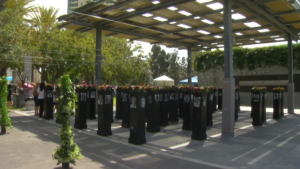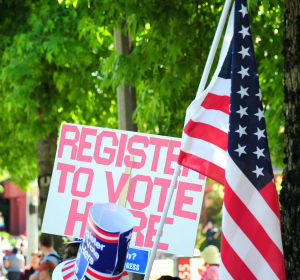OMAHA BEACH, France (AP) — Under their feet, the sands of Omaha Beach, and in their rheumy eyes, tears that inevitably flowed from being on the revered shoreline in Normandy, France, where so many American young men were cut down 80 years ago on D-Day.
Veterans of World War II, many of them centenarians and likely returning to France for one last time, pilgrimaged Tuesday to what was the bloodiest of five Allied landing beaches on June 6, 1944. They remembered fallen friends. They relived horrors they experienced in combat. They blessed their good fortune for surviving. And they mourned those who paid the ultimate price.
They also bore a message for generations behind them, who owe them so much: Don’t forget what we did.
“They probably wouldn’t be here if we hadn’t be successful,” said Llilburn “Bill” Wall, who flew bombers in WWII and will celebrate his 101st birthday this week as world leaders gather in France to pay homage to the D-Day generation.
As decades pass, D-Day anniversaries in Normandy have become increasingly fun-fair like, clogging the region’s leafy roads with WWII-era fans dressed in the uniforms and driving restored vehicles of the time. But the presence of an ever-dwindling number of veterans keeps the commemorations real, inevitably raising questions about whether the memories, pathos and lessons of WWII will fade when they are gone.
RELATED COVERAGE
“There are things worth fighting for. Although I wish there was another way to do it than to try to kill each other. But sometimes you’re called upon to do something and you just do it. You know? That’s it. These people looked death in the face and just kept right on coming,” said Walter Stitt, who turns 100 in July and fought in tanks — surviving the destruction of three.
“All those young men that never had a chance to go home and find a love of their life and hold their children in their arms,” he said on Omaha, wiping away a tear.
On the bluffs above Omaha, at the Normandy American Cemetery with 9,387 immaculately tended graves, 100-year-old Bob Gibson paid tribute to comrades who fell on D-Day, when he landed on the other, less-bloody American landing beach, code-named Utah.
“You don’t want other people to go through the same thing,” he said. “Because I’ve seen a lot of these boys that never even made the beach, believe me. And we were all 18, 19 years old.”
“I’m glad I made it. The old boy upstairs took care of me,” he said, gesturing skyward.
Across the Normandy coast where the largest-ever land, sea and air armada punctured Adolf Hitler’s defenses in western Europe on D-Day and helped precipitate his downfall 11 months later, Allied veterans are the VVIPs of this week’s 80th anniversary celebrations.
More veterans were on their way Tuesday, traveling by ferry from southern England across the English Channel that 23,000 Allied airborne troops flew over to drop on D-Day into Normandy and which more than 132,000 others crossed aboard thousands of ships that stretched as far as eyes could see, landing on Utah and Omaha and three other code-named beaches: Gold, Juno and Sword.
“It looked like you could walk across the Channel using boats as stepping stones,” recalled 100-year-old Robert Pedigo, who was a nose gunner aboard a B-24 bomber that flew over the landing beaches on D-Day to pound German forces from the air. He was part of the veteran group that visited Omaha on Tuesday, brought to France for the 80th anniversary by American Airlines.
Back at base on D-Day night, he was told the Allies had suffered thousands of casualties.
“Overwhelming,” he recalled. Although his bombing mission that day proved to be among the “easiest” of 30 he flew over occupied France and Nazi Germany, “the emotional impact was the greatest.”
More than 4,400 Allied troops were killed on D-Day, including more than 2,500 Americans. The Allied toll grew appallingly in the Battle of Normandy that ensued, with 73,000 killed and 153,000 wounded.
Eight decades on, veterans are making more pleasant new memories to go with painful old ones.
Aboard the Mont St. Michel ferry carrying them Tuesday to France, about 20 British veterans gathered on deck and waved like rockstars to well-wishers who cheered them off.
A pipe band struck up a stirring rendition of “Brave Scotland.” Sailors stood at attention. Fireboats blasted their hoses in an arc. A military transport plane flew past twice.
RAF veteran Bernard Morgan, who worked in communications on D-Day, chuckled: “It was more pleasant coming today than it was 80 years ago.”
___
Danica Kirka reported from the Mont St. Michel ferry in the English Channel.




